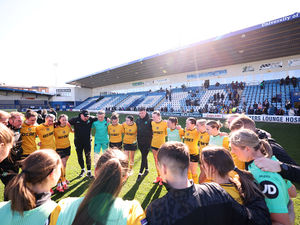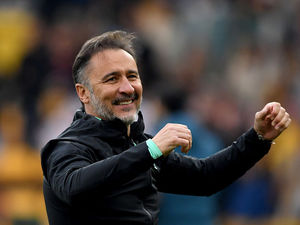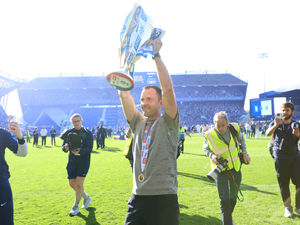How Wolves plunged to the lower leagues and nearly ceased to exist - Part 5: All is well on the pitch
In more detail than ever before, the Express & Star tells the full Bhatti brothers story - a troubled era which saw Wolves plunge to depths of the lower leagues and face financial oblivion. In Part 5, things are going well on pitch but behind the scenes disaster is waiting to strike.
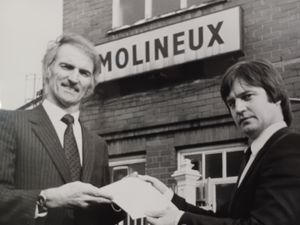
Having made such a flying start to the 1982/3 season, it was understandable that Wolves fans paid little interest to what was happening behind the scenes. Besides, after months of boardroom coups, backstabbing and intrigue, you could hardly blame fans for focusing on the football.
But while "the Doog" was the very popular public face of the new broom – he stood on the terraces for the first game of the season – there still remained questions about who actually owned the club.
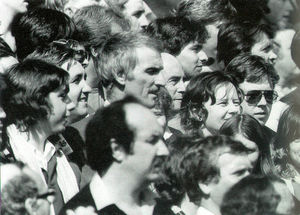
During the takeover process, talk about Dougan's backers was always somewhat vague, and usually referred to a "Manchester-based consortium". Dougan was often flanked by Douglas 'Dougie' Hope, a 37-year-old Scottish property developer who would become the club's vice-chairman.
Hope had moved to Wolverhampton at the age of 19 to take up a job as a sales rep, and as a young man he would stand on the terraces at Molineux in awe of the Doog's skills. The pair would become good friends, and Hope would become Dougan's loyal lieutenant. But, successful though Hope had been in business, it was obvious that neither he nor Dougan would have had the means to take over the club without external backing. And whenever reporters asked about their “friends in the North”, their questions were met with stony silence.
Speculation grew that the massive Co-operative Wholesale Society, who had their headquarters in Manchester, were the mystery backers. Given that Dougan and Hope had spoken about building a supermarket or leisure complex on land owned by the club, it was easy to see why they may have come to that conclusion.
But it would gradually emerge that the Manchester connection came not through the grand offices of an old-established retail empire, but a portable building on the perimeter of Manchester airport.
Investigation work by Express & Star reporter Derek Tucker revealed that the money to buy Wolves had come from Allied Properties, the UK off-shoot of a larger Swiss-based company.
Allied, whose registered office was at the Royal Exchange buildings in Manchester, was listed with Companies House as dealing in 'land trafficking', and had 'substantial interests in the Middle East'.
The company had four directors, Mike Rowland, a 40-year-old chartered surveyor from Stockport, Wilbur J Smith Jnr, an American financier with an office in London's West End, and Arab commodity dealers Mahmud Bhatti and Mohammed Akbar Bhatti, described as 'non-British residents with business addresses in Manchester'. Allied's 50,000 shares were split three ways, with the Bhattis holding one share each, and the remaining 49,998 being owned by the Swiss holding company Al Akbar Investments and Trust. The Bhattis were also directors of the Allied Arabian Trading Company and Allied Arabian Mineral Resources.
Tucker's investigation revealed that Rowland was advised on development matters by his close friend John Starkey, a 31-year-old architect from Chorley – a town which would go on to play a significant role in Wolves' history. The pair were both business associates of Dougan's right-hand man Hope, who introduced them to Dougan. In the weeks leading up to the takeover, the Rowland and Starkey had travelled to Molineux on at least three occasions to talk to assistant receiver Alan Adam, and to consult with officials from Wolverhampton Council about the possibility of major redevelopment work around Molineux.
After satisfying themselves on the potential of the ground, the Allied Properties men contacted one of the four main banks – believed to be NatWest – to arrange the finance.
Rowland revealed that the bid almost collapsed at the last minute when a deal being negotiated to raise the funds did not come off in time. Frenzied negotiations with Allied's parent company in Switzerland resulted in a two-year loan to provide the vital money.
At one stage, Rowland had to make hurried arrangements to sell off one of his company's other UK assets to meet the receiver's asking price. With the benefit of hindsight, this could have been interpreted as a warning sign that the deal was being put together on a shoestring. But with Wolves being saved with three minutes to spare, it didn't seem like the time to look a gift horse in the mouth.
Rowland said the new team in charge of the club were not the usual "cigar smoking set of directors".
We are enthusiastic and excited about the prospects of developing Wolves, though the football club will be left to Derek," he said.

